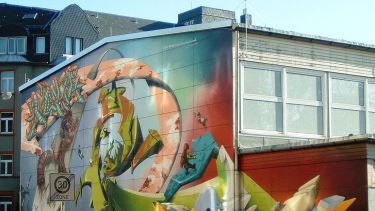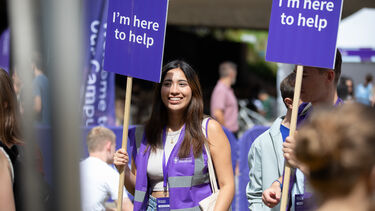German Translation Competition 2021
We are delighted to announce this year’s University of Sheffield German Translation Competition for Year 12 and Year 13 students in the UK.

The Winners of our German Translation Competition 2021
Congratulations to the 10 winners of our German Translation Competition! They are (in alphabetical order):
- Lucy Barnard, Wallington High School for Girls
- Emma Davis, Comberton Sixth Form
- Charlie Harrison, Stockport Grammar School
- Max Holden, Lady Manners School
- Wilfred Lamont, King Edward VII School
- Anna Macchi, James Allen's Girls' School
- Sally MacMahon, Latymer Upper School
- Harry Stone, Repton School
- Luckshika Sutharsan, Woodford County High School
- Charlotte Yan, Westminster School
We received nearly 50 entries for the competition and very much enjoyed reading them! As ever, the overall standard was impressively high. Many thanks to all of you who entered the competition.
A fair copy of the translation, based largely on the best entries, is available below. We are not able to give feedback on individual entries but a fair copy of the translation, which incorporates many solutions from our entrants, is available under "Text and Translation".
Vielen Dank an alle, die teilgenommen haben, und herzlichen Glückwunsch an unsere Gewinner*innen!
Dr Caroline Bland and Colleagues in Germanic Studies
- Text
-
Deniz Ohde, Streulicht (Berlin: Suhrkamp, 2020)
Deniz Ohde’s prize-winning first novel tackles prejudice around class, ethnicity and mental illness, as the unnamed narrator struggles to piece together what made her fail at school and how she eventually succeeds in moving beyond her small, dysfunctional family to get to university. Ohde confronts the long German tradition of the ‘Bildungsroman’, a genre which originally celebrated its hero’s successful navigation of educational, social and romantic challenges. Streulicht delivers a careful and compelling dissection of daily life, which reveals how low expectations and subtle, often unintentional, discrimination can scupper young people in a system supposedly designed to offer equal opportunities for everyone. In this passage, the narrator is about to start evening classes, hoping to catch up on qualifications which will help her out into the wider world. The day before she starts, she sees a TV documentary about students from the same college, reinforcing all the clichés which had led her to drop out years before.
A short summary and review of the book can be found here
And an interview with the author here (4 mins)
Die Abendschule war der Ort, an dem die Protagonisten – drei junge Männer aus den Vororten – »ihr Leben wieder auf die Reihe bekommen wollten«. »Es gibt hier nicht nur glitzernde Hochhausfassaden«, sagte der Sprecher, während die Bürotürme der Innenstadt in gleißendem Tageslicht gezeigt wurden, »sondern auch tiefe Abgründe«, worauf die Kamera in die Stadt hineinzoomte, auf einen Bürgersteig, wo die drei inmitten einer Schülermenge vor der Schule standen und rauchten. Die Kamera fing die schnellen Züge ein, die sie von ihren Zigaretten nahmen, die Schuhspitzen auf den Gehwegen, schräg voneinander abgespreizt, natürlich die tiefsitzenden Hosen und später, in ihrer Siedlung, die überquellenden Mülltonnen, die Kinder, die zwischen den Häusern spielten und verstohlen ihre Gesichter um die Ecke streckten. [...] Die Häuser standen an der Autobahn, ragten weit über deren Schallschutzmauer hinaus, und die Fassaden waren schon dunkelgrau vom Feinstaub, trotzdem hängten manche ihre Wäsche zum Trocknen aus den schmalen Fenstern. Die Doku zeigte die Männer in ihren Kinderzimmern, aus denen sie nicht herausgekommen waren, zeigte die Mütter, die Tee brachten und über das ganze Gesicht strahlten, als sie ihre Mikroständer und großen Kopfhörer herausholten, um sich beim Rappen filmen zu lassen. Man hörte die Fragen nicht, die ihnen gestellt wurden, nur ihre Antworten: »Ich war im Knast wegen Drogenbesitz«, sagte der eine, »Ich habe Sozialstunden bekommen, wegen Autoknacken«, der andere. Dass sie eigentlich Musik machen wollten, geriet in den Hintergrund. Seit eine von der Abendschule es mal zu den No Angels geschafft hatte, wollten alle mit der Musik nach draußen.
(250 words)
- Translation
-
The night school was where the protagonists - three young men from the suburbs - “wanted to get their life back on track again”. “There are not only gleaming skyscrapers here” said the narrator, as the towering office blocks of the city were shown in dazzling daylight, “but also deep abysses”. At this point the camera zoomed down into the city, onto a pavement where the trio stood smoking in the middle of a crowd of pupils in front of the school. The camera captured the quick drags they took on their cigarettes, the tips of their shoes on the pavement, pointing away from each other, their low-slung trousers, of course, and later, the overflowing rubbish bins on their estate, the children playing between the buildings, peeping surreptitiously round the corner. [...] The buildings stood near the motorway, looming well above its soundproof barrier, and their facades had turned dark grey from the pollution particles, yet despite that some people still hung their washing out to dry from the narrow windows. The documentary showed the men in their childhood bedrooms, which they had not yet been able to leave behind, showed their mothers who brought in tea and smiled from ear to ear, as they fetched out their mic stands and large earphones to be filmed when they were rapping. You couldn’t hear the questions they were being asked, only their answers: “I was locked up for possessing drugs”, said one of them, “I got community service for stealing cars” said another. The fact that they actually wanted to make music slipped into the background. Ever since a girl from the night school had once got into ‘No Angels’, everyone saw music as a way out.
- About the competition
-
The prize
The authors of the ten best entries will each receive a prize of a £25 book token and an invitation to take part in a special virtual Translation Workshop organized by the School of Languages and Cultures at the University of Sheffield, involving German academics, Masters students in Translation Studies and alumni who work in translation-related fields. The Workshop will be held on Wednesday 15 December 2021.
The judges
The translations were read and judged by a panel of German experts from the School of Languages and Cultures at the University of Sheffield.

Visit us
Discover what sets Sheffield apart at our undergraduate open days on Saturday 21 June and Saturday 5 July 2025.
